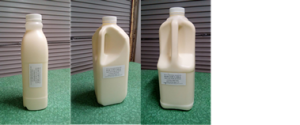This review analysed outbreaks of human cryptosporidiosis due to raw milk. The objective of our study was to highlight and identify underestimated and underreported aspects of transmission of the parasite as well as the added value of  genotyping Cryptosporidium isolates.
genotyping Cryptosporidium isolates.
Methods
We conducted a descriptive literature review using the digital archives Pubmed and Embase. All original papers and case reports referring to outbreaks of Cryptosporidium due to unpasteurized milk were reviewed. The cross-references from these publications were also included.
Results
Outbreaks have been described in the USA, Australia, and the UK. Laboratory evidence of Cryptosporidium from milk specimens was lacking in the majority of the investigations. However, in most recent reports molecular tests on stool specimens along with epidemiological data supported that the infection was acquired through the consumption of unpasteurized milk. As the incubation period for Cryptosporidium is relatively long (days to weeks) compared with many other foodborne pathogens (hours to days), these reports often lack microbiological confirmation because, by the time the outbreak was identified, the possibly contaminated milk was not available anymore.
Conclusion
Cryptosporidiosis is generally considered a waterborne intestinal infection, but several reports on foodborne transmission (including through raw milk) have been reported in the literature. Calves are frequently infected with Cryptosporidium spp., which does not multiply in milk. However, Cryptosporidium oocysts can survive if pasteurization fails. Thus, pasteurization is essential to inactivate oocysts. Although cryptosporidiosis cases acquired from raw milk are seldom reported, the risk should not be underestimated and Cryptosporidium should be considered as a potential agent of contamination. Genotyping Cryptosporidium isolates might be a supportive tool to strengthen epidemiologic evidence as well as to estimate the burden of the disease.
A review of outbreaks of cryptosporidiosis due to unpasteurized milk, 15 April 2020
Infection
Tamara Ursini, Lucia Moro, Ana Requena-Méndez, Giulia Bertoli & Dora Buonfrate
https://link.springer.com/article/10.1007/s15010-020-01426-3
